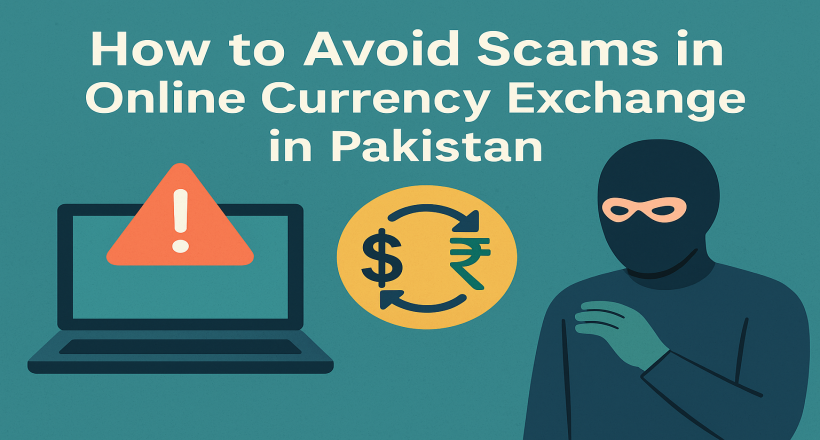We are using a merchant for PayPal and Stripe so in order to buy from their gateway you have to buy a minimum of 100 PKR equivalent.

Online currency exchange in Pakistan is booming. People now prefer digital transactions over traditional methods because it’s fast, convenient, and often offers better rates. But with great convenience comes great risk — scammers are also on the rise.
You might think, "Scams won’t happen to me," but they can happen to anyone. So, how do you protect yourself? This guide will show you step-by-step how to spot red flags and make safe exchanges every time.
In simple terms, it’s the process of converting one currency into another through a digital platform — often for purposes like freelancing payments, overseas shopping, or crypto investments.
Wise (TransferWise)
Western Union (digital version)
Payoneer
Binance P2P for crypto exchanges
Faster transaction times
Real-time exchange rates
Reduced dependency on physical locations
Flexibility in managing international finances
These sites look professional but are designed to steal your money or data.
Scammers pose as official exchange agents on Facebook, WhatsApp, or Instagram.
You may receive emails or texts with links asking for account or payment info.
If it looks too good to be true, it probably is. Always cross-check with SBP or credible platforms.
Scammers ask for payment first and then disappear.
Scammers send you a number or message saying “I’ll give you Rs. 310 for $1,” luring you into a trap.
Always check if the company is legally registered.
Scammers often say, “This rate is only valid for 5 mins,” forcing you to act without thinking.
Misspellings, broken links, and amateur design are red flags.
Look for the padlock icon in the URL bar. No padlock = unsafe.
Check reviews on third-party sites, not just their own website.
Visit the SECP website to verify if the company is listed.
A legit business should have a contact number and address you can visit or call.
Platforms like Trustpilot or SiteJabber are helpful.
Google the name, check forums, read reviews.
Stick to known platforms or ones registered with regulatory authorities.
No legit company will ask for your OTP or login info.
Avoid EasyPaisa/JazzCash without confirmation and screenshots.
Use SBP’s official site to check rates.
Google Safe Browsing – To check if a site is blacklisted.
Who.is Lookup – Find out who owns the domain.
Trustpilot – Honest user reviews.
SECP Portal – Verify business registration.
FIA Cyber Crime Unit – Report suspicious platforms.
Ahmed sent Rs. 50,000 to a Facebook "agent" promising Rs. 325/$ — and never heard back.
Fatima saw a deal offering Rs. 340/$ and sent funds, only to be ghosted.
Ali used a shady website; his bank showed “completed,” but the receiver never got the money.
If you’ve been scammed:
File an FIR with FIA Cyber Crime Wing
Report to SECP or SBP if it's a registered exchange
Visit https://complaint.fia.gov.pk/ to file online
Share Posts on Social Media
Educate Friends & Family
Write Google Reviews
Create awareness just like you’d warn about a pickpocket on the street.
If you run an exchange:
Ensure live support availability
Comply with Know Your Customer (KYC) policies
Secure your site with SSL and regular audits
Ensures businesses are registered and legal.
Manages official exchange rate policies and regulates money transfer companies.
Investigates online fraud and scams. They’ve already busted many fake exchange rings.
Fintech Integration will make exchanges safer.
Blockchain-backed Exchanges will boost transparency.
Government Monitoring is expected to become stricter.
Online currency exchange is the future — but only if done safely. Whether you're a freelancer, investor, or business owner, staying alert and informed is your best defense. Don't let a good deal blind you. Always verify, validate, and then transact.
No, always verify their license and reviews. Stick to well-known platforms.
Report to FIA Cyber Crime Wing immediately and contact your bank.
Only if the dealer is registered and verified. Otherwise, it’s risky.
Check the SECP website or ask for the registration number directly.
Too-good-to-be-true rates, lack of SSL on the website, pressure tactics, and anonymous profiles.